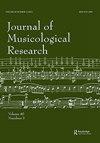杰拉德·芬齐的书信,1915-1956
IF 0.4
2区 艺术学
0 MUSIC
引用次数: 0
摘要
过去一个世纪或更久的英国作曲家已经出版了几英尺的作品。本杰明·布里顿(Benjamin Britten)的书有六卷,每卷约800页,篇幅粗大,但不得不说,布里顿的作品是如此详尽,以至于人们常常很难在所有的评论中找到一封信。爱德华·埃尔加(Edward Elgar)有四卷书,两卷是给他的出版商的,一本是《风之花》(Windflower),一本是《一生的书信》(Letters of a Lifetime)。其他几个选择之前和之后的克拉伦登出版社提供了令人敬畏的杰罗尔德·诺斯罗普·摩尔。弗雷德里克·德留斯的《书信生活》有两卷相当大,但只有一卷是由记者奇怪地为迈克尔·蒂皮特整理的,他对梦的无休止的解释很快就会让人厌倦。威廉·沃尔顿有一卷,拉尔夫·沃恩·威廉姆斯也有。在后一种情况下,休·科布英勇地克服了字迹难以辨认和对日期的厌恶。与此相反,没有学者系统地研究过《巴克斯选集》、《罗索恩选集》、《伯克利选集》(除了各种写作和访谈选集)、霍尔斯特、帕里、斯坦福、布里奇、布利斯、兰伯特、史密斯或沙利文。然而,在某些小作曲家身上却花费了大量的精力和资源,我们可以合理地说,当他们发表的信件与更杰出的同事放在一起时,会给人带来更大的乐趣。的确,没有哪个克莱因迈斯特的交流能比得上奥古斯特·耶格尔与埃尔加关于《杰罗尼修斯之梦》最初失败的高潮的交流。但是,凯尔西·桑顿(Kelsey Thornton)编辑的《艾弗·格尼书信集》(The collection of Letters of Ivor Gurney)却给人留下了深刻的印象;巴里·史密斯编辑的四卷精美的彼得·沃洛克书信;以及杰拉德·芬齐书信的最新版本。为什么这些人在通信中活得如此生动?这并不是说他们比其他作曲家更全面或更正常。人们不会说这三个中的任何一个。但他们培养了这样一种观念,即他们的生活表现与其说是工具性的问题,不如说是通过他们的媒介——书页上的音符、舞台上的演奏者和歌手、观众中的信徒、操纵琴弦的出版商和赞助人——来表现创造性的天真。无论是诗歌、现在的音乐、过去的音乐、大自然的浪漫和丰富,还是人类的弱点,只要能给他们带来最近的丰富,他们就会情不自禁地睁大眼睛从树上摘下,并模仿生活赐予他们的慷慨和有序。可能会出现一首歌,或者是别人的学术版本,或者是一首散漫的诗,或者是一首淫秽的打油诗。一座图书馆,一个果园,一段友谊,甚至是一种敌意都可能生长。可能会写一封信。我认为,在生活中扮演这个角色是一种基本的快乐,而不是本文章由计算机程序翻译,如有差异,请以英文原文为准。
Gerald Finzi’s Letters, 1915-1956
English composers of the past century or more have generated several shelf feet of published letters. Benjamin Britten’s run to six stout volumes of around 800 pages each, though the apparatus is so dense and, it has to be said, the Britten industry so exhaustive that one is often hard put to it to find a letter among all the commentary. Edward Elgar sports four volumes, two for his publishers, one for “Windflower,” and one for Letters of a Lifetime. Several other selections have preceded and succeeded this Clarendon Press offering by the redoubtable Jerrold Northrop Moore. There are two sizable volumes of Frederick Delius’s Life in Letters, but only one, curiously organized by correspondent, for Michael Tippett, of whose interminable dream interpretations one can soon weary. William Walton has one volume, as does Ralph Vaughan Williams. In the latter case, Hugh Cobbe heroically surmounted his illegible handwriting and aversion to dates. Against this, no scholar has systematically tackled a Collected or Selected Bax, Rawsthorne, Berkeley (beyond a varied anthology of writings and interviews), Holst, Parry, Stanford, Bridge, Bliss, Lambert, Smyth, or Sullivan. Yet great care and resources have been lavished on certain minor composers whose published letters, it can plausibly be claimed, will give the greater pleasure when placed side by side with those of their more eminent colleagues. True, no Kleinmeister’s exchange will equal the awesome importance of August Jaeger’s with Elgar about the initially flunked climax of The Dream of Gerontius. But one looks with considerable affection on The Collected Letters of Ivor Gurney, edited by Kelsey Thornton; on the four handsome volumes of Peter Warlock’s letters edited by Barry Smith; and on the present edition of Gerald Finzi’s letters. Why do these men live so vividly in their correspondence? It is hardly that they were more rounded or normal human beings than their fellow-composers. One would not say that of any of the three. But they foster the idea that their performance of life was less a matter of instrumentality, of ambition through their medium—notes on the page, players and singers on the stage, devotees in the audience, publishers and patrons pulling the strings—than of creative innocence. They could not stop themselves from plucking wide-eyed from the tree whatever gave them the nearest enrichment, be it poetry, present music, past music, the romance and plenitude of nature, or the foibles of humans, and from emulating the bounty and orderliness of life’s gift to them. A song might emerge, or a scholarly edition of someone else’s, or a rambling poem, or an obscene limerick. A library or an orchard or a friendship or even an enmity might grow. A letter might be written. There is, I think, a fundamental happiness about this role in life, which is not
求助全文
通过发布文献求助,成功后即可免费获取论文全文。
去求助
来源期刊
CiteScore
0.30
自引率
0.00%
发文量
17
期刊介绍:
The Journal of Musicological Research publishes original articles on all aspects of the discipline of music: historical musicology, style and repertory studies, music theory, ethnomusicology, music education, organology, and interdisciplinary studies. Because contemporary music scholarship addresses critical and analytical issues from a multiplicity of viewpoints, the Journal of Musicological Research seeks to present studies from all perspectives, using the full spectrum of methodologies. This variety makes the Journal a place where scholarly approaches can coexist, in all their harmony and occasional discord, and one that is not allied with any particular school or viewpoint.

 求助内容:
求助内容: 应助结果提醒方式:
应助结果提醒方式:


